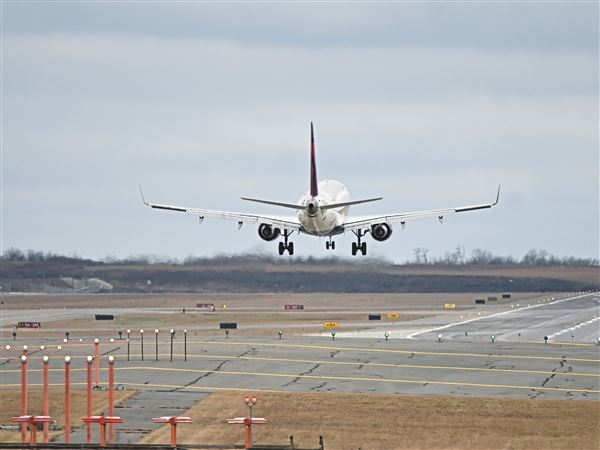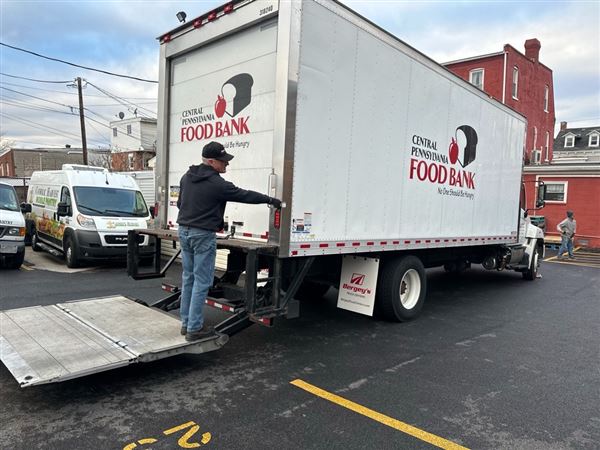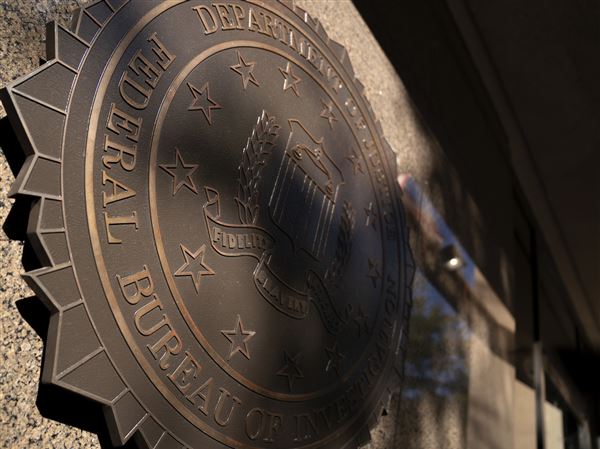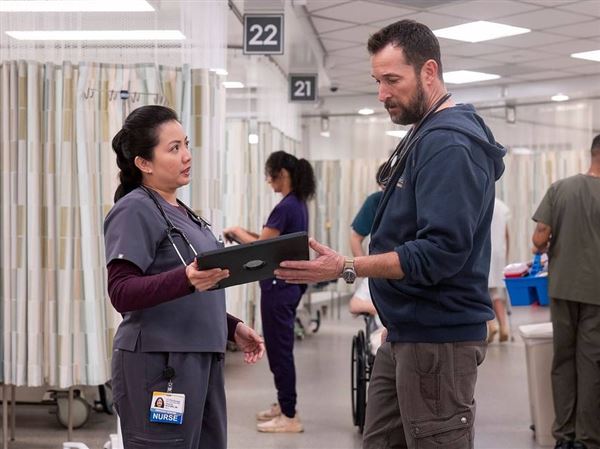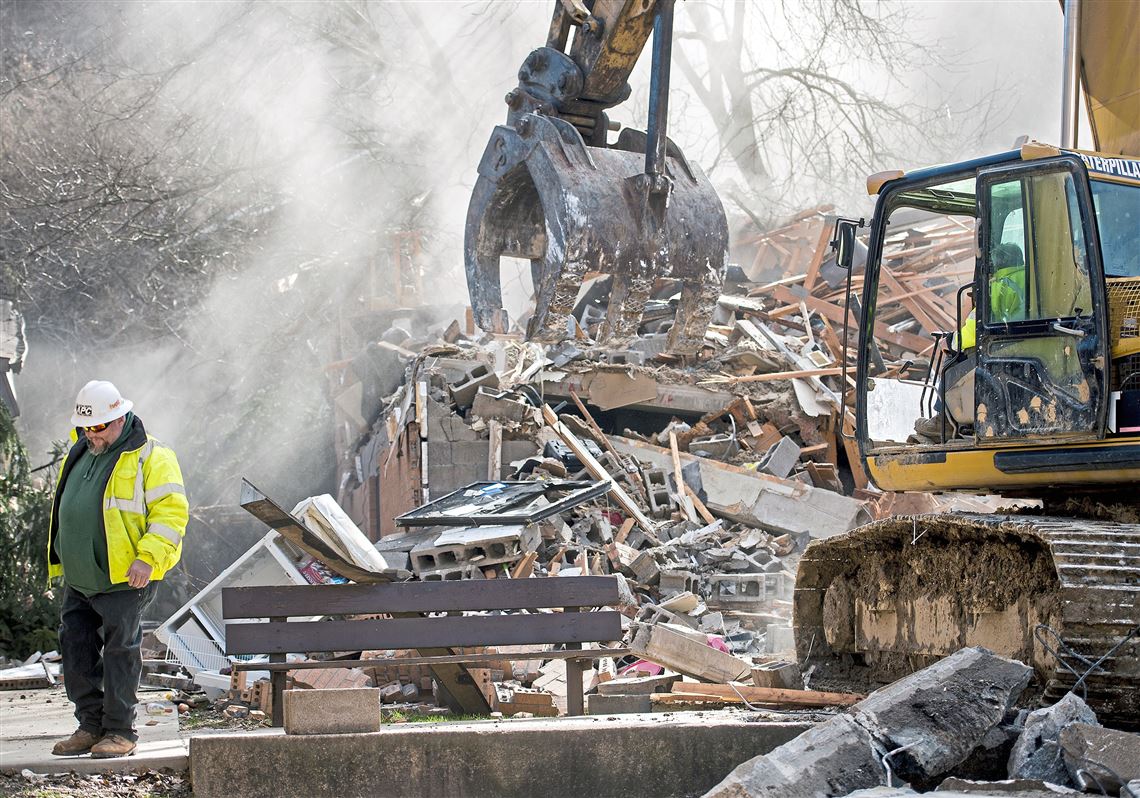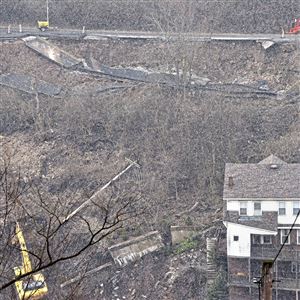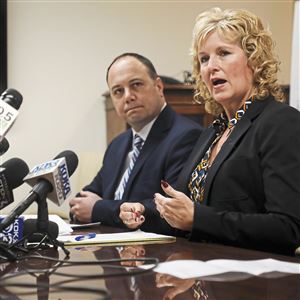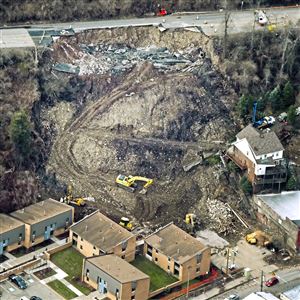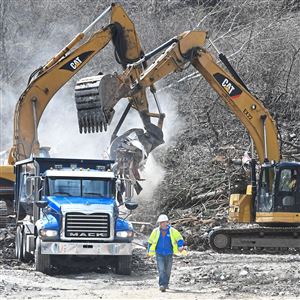The evacuation order rang out before dawn: Elderly residents of a senior living center must gather their belongings and get out — now.
The dramatic operation came as a section of Route 30 suddenly buckled and collapsed more than 30 feet down a steep hillside above Electric Avenue in East Pittsburgh, unleashing a cascade of mud, rocks and debris that severed power lines and ruptured natural gas pipelines.
The collapse, which occurred about a half-mile from the Westinghouse Bridge, was a destructive answer to weeks of uncertainty and growing concern about the integrity of the road, a major artery that connects the Parkway East to communities such as North Versailles, East McKeesport and North Huntingdon.
Crews with the Pennsylvania Department of Transportation had been inspecting a 200- to 300-foot stretch of the four-lane highway that had buckled and shifted since early March. Last week, PennDOT restricted traffic on some lanes and, on Friday, it closed the entire highway. About 11,000 vehicles use the highway in each direction every day.
On Saturday, Cheryl Moon-Sirianni, executive for PennDOT's District 11, said her department and outside experts had been inspecting movement under Route 30 for several days prior to the collapse and did not believe a landslide was the cause.
“It was sinking before, but we never imagined it was a landslide,” said Ms. Moon-Sirianni, speaking with reporters on Electric Avenue. The road had been buckling in the middle, while a landslide would be expected to erode the edges of the highway, she said.
"We thought part of this might be caused by drainage concerns,” she said, and crews checked pipes underneath the road. Only when they drilled into the ground did they notice the landslide and began evacuations, she said.
It was just in time. At about 6 a.m. on Saturday, she said, most of the highway along that stretch caved in. Mud and debris slid down the hill to Electric Avenue, destroying one home and threatening others. Several units in the Electric Avenue Apartments, a senior living center, were damaged and two had to be demolished.
A total of about 31 people were forced to leave their homes before and after the landslide, ferried on Port Authority buses to nearby hotels or sent to live with family members.
No injuries were reported, said Braddock Fire Chief Tom Petrovic, though two people who were bed-bound or in a wheelchair were taken to Forbes Regional Hospital in Monroeville for a precautionary evaluation. PennDOT has arranged to provide temporary housing and living essentials for displaced residents.
A number of the displaced residents from the Electric Avenue Apartments who were put up at the Comfort Inn in Wilkins said they lost everything except for the clothes they were wearing.They said they should have been warned about a potential evacuation earlier, which would have given them more time to prepare.
“Why didn’t they do something?” said Roberta Leonard. “I have nothing.”
Ms. Moon-Sirianni told the displaced residents staying at the hotel that it was unlikely any of their belongings would be recovered. She said they should make a list of everything they lost, and PennDOT would see about reimbursing them.
“I’d rather get my stuff back than the money,” said Larry Robinson, 67, a musician who said he lost four guitars, two amplifiers and a PA system to the landslide.
PennDOT would pay for the residents to stay at the hotel, Ms. Moon-Sirianni said, and it would also help people find permanent lodging. She also said arrangements would be made for residents who didn’t have transportation to pick up their medications at pharmacies.
Ms. Moon-Sirianni said PennDOT plans to demolish properties at the bottom of the hill along Electric Avenue, clear the debris, and perform drilling tests to measure the depth of the landslide. Then, she said, engineers can figure out the best way to repair the hillside.
One white house, still standing next to the land slide, could be demolished soon. Its owner, Chris Morgan, paced angrily Saturday afternoon, fuming that PennDOT had not shored up the hillside earlier.
Problems with shifting ground and subsidence “has been going on for 15 years,” Mr. Morgan said, standing across the street from his home, which was behind a barricade of caution tape and utility trucks.
“I've been telling them for years there's a problem up there, right above me,” he said. “And this could've been prevented.”
Around 1 p.m., Mr. Morgan was allowed to enter his home to gather some remaining personal items. Firefighters stood alert outside and watched the hillside for any movement.
Ms. Moon-Sirianni acknowledged Mr. Morgan’s frustration but said “we do believe the home is in danger.”
“It's very difficult when some place you have lived your whole life is in a situation like this,” Ms. Moon-Sirianni said. “We will be very understanding and cooperative with him.”
Meanwhile, it will likely take months before crews can shore up the hillside and rebuild Route 30, she said. Emergency proclamations issued by the state, as well as the mayors of East Pittsburgh and North Braddock, allow PennDOT to quickly mobilize resources, she said.
The agency plans to issue detours to divert the highway’s traffic onto a route other than Electric Avenue, a two-lane road that will become a busy staging ground for construction crews for weeks to come. On Saturday, emergency vehicles, utility trucks and heavy earth-moving equipment zoomed into the borough. They filled the parking lot of Olympia Banquet Hall, which served as a gathering spot for the emergency crews and provided coffee and food.
In the banquet facility, there were still unanswered questions.
“We don't know which way the hill is going,” Chief Petrovic told reporters. “The hill is still moving as we speak.”
John Katz, chairman and president of Brandywine Agency Inc., the nonprofit that runs the Electric Avenue Apartments and several other apartment complexes in the Pittsburgh area, said his residents were lucky to make it out.
Had the earlier evacuations not occurred on Friday, he said, gesturing behind him at the rubble, “those residents may have died last night.”
The displaced residents, though, were frustrated officials let the problem develop as far as it did.
“They let us stay in danger, in harm’s way, until the day of,” Mr. Robinson said. “When things like this happen, you’re supposed to let your tenants know what’s going on.
“We could have got killed in there, nothing was said,” he said. “The only thing we had to do the day of was get out.
“I thought personally that wasn’t handled properly because a lot of people’s lives were in jeopardy.”
Daniel Moore: dmoore@post-gazette.com, 412-263-2743 and Twitter @PGdanielmoore. Ed Blazina and Andrew Goldstein contributed reporting.
First Published: April 8, 2018, 3:34 a.m.
Updated: April 8, 2018, 3:34 a.m.

